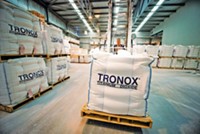Advertisement
Grab your lab coat. Let's get started
Welcome!
Welcome!
Create an account below to get 6 C&EN articles per month, receive newsletters and more - all free.
It seems this is your first time logging in online. Please enter the following information to continue.
As an ACS member you automatically get access to this site. All we need is few more details to create your reading experience.
Not you? Sign in with a different account.
Not you? Sign in with a different account.
ERROR 1
ERROR 1
ERROR 2
ERROR 2
ERROR 2
ERROR 2
ERROR 2
Password and Confirm password must match.
If you have an ACS member number, please enter it here so we can link this account to your membership. (optional)
ERROR 2
ACS values your privacy. By submitting your information, you are gaining access to C&EN and subscribing to our weekly newsletter. We use the information you provide to make your reading experience better, and we will never sell your data to third party members.
Inorganic Chemicals
Ineos may nab a Tronox white pigment plant
Tronox wishes to smooth its merger with Cristal by selling a US TiO2 facility
by Alexander H. Tullo
December 6, 2018

Tronox may sell a titanium dioxide complex in Ashtabula, Ohio, to Ineos for $700 million. Tronox hopes that the proposed transaction will remedy US Federal Trade Commission concerns about its merger with rival Cristal.
The FTC has been trying to block Tronox’s merger with Cristal—the sixth and second largest makers of the white pigment in the world, behind number one Chemours—on the grounds that the combined firm would have too commanding a market share in high-value chloride-process TiO2.
The merger was 2 rival Cristal">announcedin February 2017. The case is now in the hands of an administrative judge, who must decide whether to submit the proposed divestiture to the FTC so the agency can consider if the sale will ease its concerns about the larger deal.
The Ashtabula plant, still owned by Cristal, has two chloride-process TiO2 units with a combined capacity of 245,000 metric tons per year.
This summer, Tronox signed an agreement to sell the Ashtabula plant to rival Venator in a deal potentially worth $1.1 billion. However, that transaction fell through when the 75-day exclusivity period between the firms expired in October before they could come to terms.
In a conference call with analysts in November, Tronox CEO Jeffry N. Quinn disclosed that Tronox “commenced discussions with a well-capitalized global chemical company not currently in the TiO2 industry concerning a potential divestiture of Ashtabula.”
Ineos fits that description. The British company has built itself into one of the world’s largest chemical companies through purchases of other firms’ unwanted divisions.
It has been particularly acquisitive in recent months. Ineos just completed the purchase of an intermediate chemicals plant near Chicago from Koch Industries’ Flint Hills division. Last month, it agreed to purchase Ashland’s composites business for $1.1 billion.
Ineos tends to invest in petrochemicals, not inorganic chemicals such as TiO2. One investment the company does have in inorganics is its minority stake in US silicas maker PQ.



Join the conversation
Contact the reporter
Submit a Letter to the Editor for publication
Engage with us on Twitter